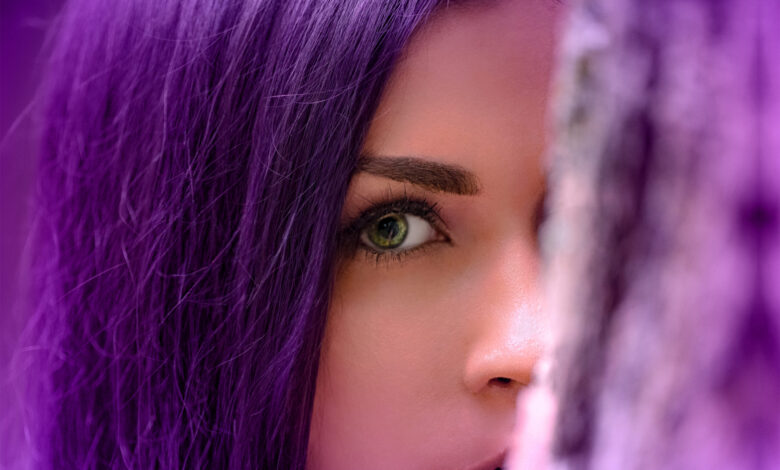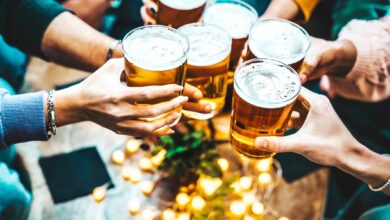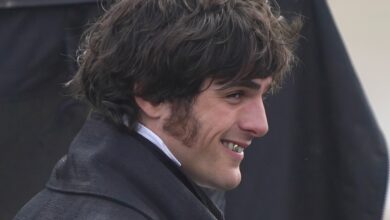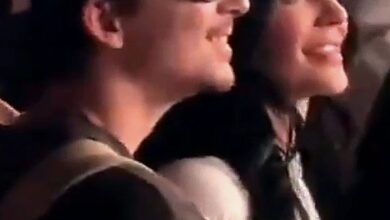Raw, Honest, and Unpredictable: Melia Maccarone Talks Latest Album, ‘Feral’

Melia Maccarone has always been known for her powerful guitar work and raw, emotive songwriting, but her latest album, Feral, takes her artistry to an entirely new level. Recorded at the historic Dreamland Recording Studios with Grammy-winning producer Kevin Killen, Feral is a deeply personal exploration of grief, resilience, and self-discovery. The album captures a turbulent chapter of Melia’s life, marked by loss, betrayal, and the isolation of the pandemic, and channels those experiences into songs that are both haunting and cathartic. In this interview, Melia opens up about the inspiration behind the title track, the transformative power of vulnerability in music, and the creative journey that shaped her most authentic release to date.
What inspired the title Feral, and how does it connect to the overall theme of the album?
I remember writing the song “Feral” at the height of the pandemic. Late 2019 was a very hard year for me. I had lost both my grandparents, whom I was very close to. I had experienced betrayals from people I thought I could trust. I had been struggling with OCD, depression, and anxiety for a few years prior as well. All of those things, plus a pandemic happening, amplified my tendency to want to self-isolate. I felt a lack of trust and belonging. I felt lost after my grandparents passed. I took it very hard. “Feral” represented all I was going through. I felt like I was in survival mode.
The album carries many different emotions throughout that I think contribute to getting to a point of feeling “Feral.” Feelings of anxiety, grief, depression, betrayal, anger, sadness, nostalgia, wishing I could change the past. Sometimes, I get so overwhelmed by my feelings or situations that I truly do shut down.
I think a huge thing for mental health is being able to be open about it and not feel ashamed.
What emotions or messages do you hope listeners take away from this album?
I think the message I hope listeners take away is that we’re all human. We all go through tough times, and you’re not alone. I’d want them to connect to the emotions they’re feeling and feel a release just like I did. Most importantly, that they’re seen. It’s okay to not be okay. I think a huge thing for mental health is being able to be open about it and not feel ashamed. We need to end the stigma.
How does this album differ from your previous work in terms of style, songwriting, or themes?
I think it differs in song structure. It feels less predictable musically. Guitar solo-wise, I focused less on how many notes I could play and more on feel and what the song called for naturally. I think it’s the most authentic and honest work I’ve ever done.
Dreamland Recording Studios has such a rich history and unique atmosphere. How did recording in an old church with stained-glass windows influence the vibe or sound of the album?
I have to say, the sun peering through those beautiful windows every morning with the snow covering everything outside was really such a cool vibe. There was a lot of space and reverb. I loved doing my vocals in a big room like that. It gave a Led Zeppelin vibe that I just loved.
I feel incredibly honored to have worked with such a talented, incredibly humble person for all he has accomplished.
What was it like working with Kevin Killen, a Grammy-winning producer with such an impressive resume? Did he bring any specific techniques or perspectives to the table?
He had a huge part in the music being less predictable. Some of the ways he did that would be to cut or lengthen measures just enough that it gave it a really unique structure. It really highlighted the storytelling, too. He really knows how to make songs come to life and flourish in their own unique way.
Another example is how he approaches energy. He has us all play together and run takes together so that the energy I am looking for is there. Something about doing it together really is so much better, in my opinion. How we all, as Kevin said, “communicate to one another” playing the music.
I feel incredibly honored to have worked with such a talented, incredibly humble person for all he has accomplished. I am very grateful to have built this relationship with him. He has taught me a lot just by working with him. He’s so inspiring!
Can you share any memorable moments or challenges from your time at Dreamland?
Memorable moments would be just the time I spent with these incredible people. The laughs that I very much needed at the time. The support and excitement for the music we were laying down.
The energy we all shared together was great, and you couldn’t really ask for more in a studio setting.
I’m very picky and perfectionistic.
You wrote and performed all the music, lyrics, and most of the instrumentation on the album. How did you balance wearing so many creative hats?
I think I balance wearing so many creative hats because when I write songs, I hear parts specifically in my head, and I want to make sure the final product comes out the way I hear it in my head, generally speaking. I’m very picky and perfectionistic. I know when I’m writing what feels right and what doesn’t almost instantly. I trust my instincts and I always want to make sure it’s coming out the way I want it to.
How did you narrow down over 50 songs to the eight that made it onto the album? What made these particular tracks stand out?
I had a lot of help by getting feedback from Kevin and those closest to me. I always love hearing Kevin’s picks because a song I might think is too weird, he usually ends up liking! He really takes the time to soak the whole song in and pays attention to lyrics. I am really always so grateful and trust his input.
My grandfather LOVED “Bobybag” (believe it or not), so I had to make sure I put that on this album.
I almost did not do “Train” or “Memory Lane,” but at the last minute I changed the original picks to those ones. I think it was the right move and I’m happy with that decision.
The track names, such as “Werewolf” and “Zombiegirl,” hint at a darker, possibly supernatural tone. Can you share the stories or inspiration behind some of these songs?
“Zombiegirl” was the fastest song I wrote for this album. I had been trying to write a song about my grandpa, and even though I had, nothing quite worked for the new album. I stopped trying and subconsciously came up with Zombiegirl. I don’t think many people know or realize, but if you look at the lyrics of the song, it’s about my grandfather. We always had a special connection and bonded over music. When he passed, it was very difficult for me to get through. I felt like I was losing my other half. I felt lost.
Metaphorically speaking, it worked perfectly. I felt like a Zombie (Numb, depressed, not myself), plus the pandemic started up, so it felt like the end of the world emotionally without him in my life but also with the state of the world. It was such a crazy time. (“Ever since you left, its the end of the world”)
“Werewolf” I had written after a deep betrayal. Ironically, I had just gone through almost the same kind of betrayal again right when I recorded it, so I really let it out. It was so therapeutic for me all over again. I’ve always loved playing with metaphors and weaving that into my real-life experiences. Werewolf represents someone you thought you knew transforming into a monster. I really emphasized those characteristics and just that predatory mindset of someone who is cheating and all the further hurt that comes with that. (Lying, gaslighting, etc.)
Also, I always loved Halloween so much, so creepy metaphors usually make their way into my songs! haha!
I couldn’t ask for not only better musicians but better human beings to work with!
Paul Amorese and Chris Anderson contributed drums and bass to the album. How did their playing shape the final sound of Feral?
Paul and Chris are my favorite to work with. They are so down to earth and really care about the music they are making. I think their playing shapes the sound through the energy they bring when we all play together. We work with each other and play off each other really well. I couldn’t ask for not only better musicians but better human beings to work with!
Was there a particular song that was the hardest to write or record? Why?
“Train” was incredibly difficult because we switched around where guitar parts were originally, so singing and playing the picking part during the verses took some time to get used to! It wasn’t so much the part, but doing them together. The timing underneath my vocal part just took a lot of practice to nail as it wasn’t originally written that way. I am so happy that we did that change, though! I grew to really love that song even more because of that change.
How did you incorporate elements like keyboards and background vocals to enhance the overall soundscape of the album?
I did the keyboards and background vocals actually in my own room! First time ever doing that, and I had fun learning how to do things that way.
I usually hear a lot of the background vocals when I write songs initially. For example, on “Zombiegirl,” everything, including lyrics, backgrounds, riffs, solos came to me at once. Most of them did and some of them I just came up with on the spot.
Those creepy lyrics really slipped into my brain during a bad breakup many years ago.
The album explores a variety of moods and themes. Were there any unexpected influences that crept into your songwriting or arrangements?
Yes! “Bodybag” for sure is because I was watching WAY too many crime documentaries at the time! Haha. Those creepy lyrics really slipped into my brain during a bad breakup many years ago. I almost changed them entirely, but my grandpa loved them, and even Kevin liked them. It was an attention grabber because people won’t expect it. It was originally going to be on my previous EP and it’s the oldest song on the album. I was listening to a lot of Radiohead and Regina Specktor at the time so I think musically those influences snuck in there with the keyboard.
I think the song “Run,” musically speaking, was also very influenced by Radiohead as opposed to my previous releases. More FX like on the solo and even just how I sing on that one.
Do you have plans for a tour or live performances to promote Feral? If so, how do you envision translating these songs to the stage?
I have plans to do some touring for Feral. I think the songs translated to the stage pretty well when I did my CD Release show back in August. There are some tweaks I’d like to make to make it even better, and I might even add some extensions to improvise over in the future.
I’m very proud of the whole album.
Are there any tracks you’re especially excited to share with your fans, and why?
I’m very proud of the whole album. Even my drummer said this is the most “Melia” Release you’ve done. I’m proud of its honesty and uniqueness.
I think if I had to choose, I’m most excited to share “Horse You Rode in On” because I think everyone has felt that way at some point. I also just love the energy on stage and the Led Zeppelin influence.
What’s next for you after this album release? Are there any projects or ideas already on the horizon?
I think I will absolutely keep writing music and performing. This is a very hard business and a lot of work, but it’s a labor of love. It is and always has been therapeutic to me. I am looking forward to continuing to exploring different FX and crafting my sound more and more as time goes on. I am learning a lot about recording my own music, so perhaps some acoustic releases as well. I am also interested in exploring more online performances and covers to reach a broader audience until I can afford to tour overseas!
Feral Tracklist:
- Werewolf
- Feral
- Train
- Run
- Zombiegirl
- Memory ane
- Bodybag
- Horse You Rode In On
Learn more about Melia at meliarocks.com.



